Two new Vipers & a K6 have left the factory with Dave Hall on their way to Garda for the Eurocup which starts on Monday. Follow the results on the Rondar Facebook page.
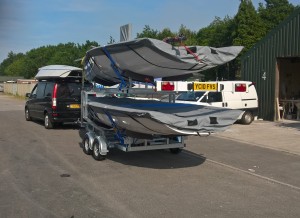




Two new Vipers & a K6 have left the factory with Dave Hall on their way to Garda for the Eurocup which starts on Monday. Follow the results on the Rondar Facebook page.

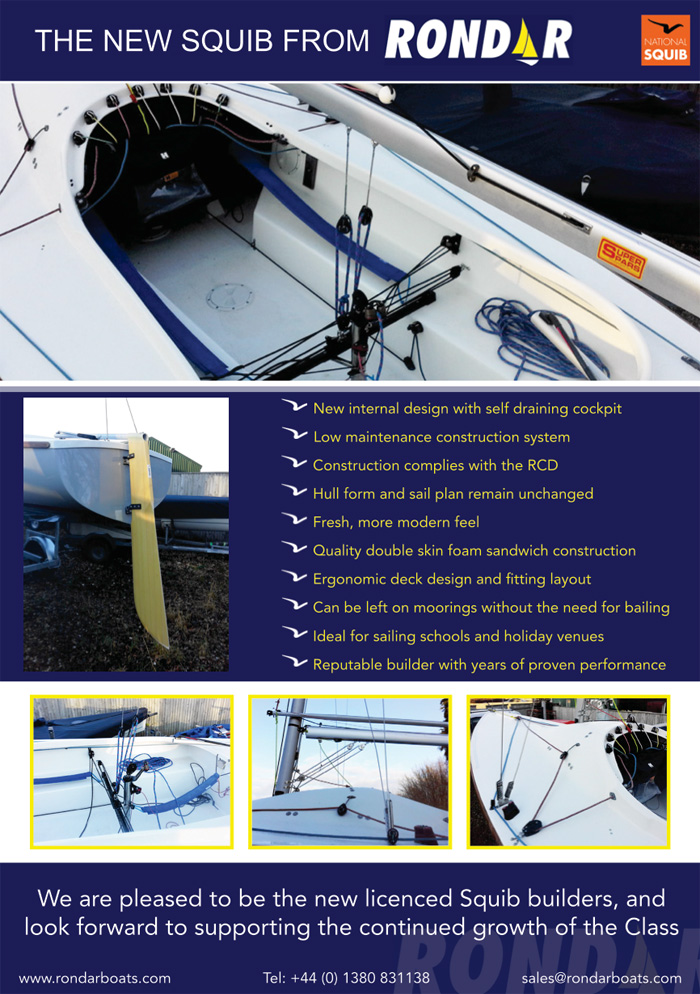
At the November 2016 AGM in Bermuda, the Class approved a retrofit for the Viper allowing the rudder to aligned vertically. This is being done to provide better steering and control in heavier conditions.
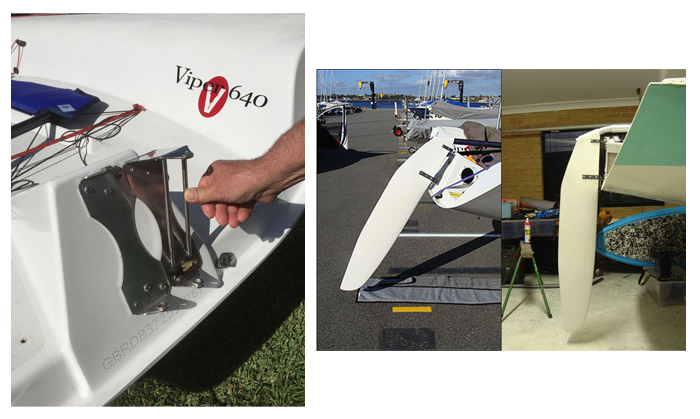
The Class Approved Viper vertical rudder adapter kits are available for pre-order at the Rondar parts website:
North American Orders Australian & European Orders
The adapter kit includes a new rudder bracket to replace your current one (see photo below) plus an angled tiller so you can use your existing rudder.
Depending upon demand, Rondar expects to ship the first batch in early April.
As the vertical rudder orientation is expected to generate higher loads on the hardware, Rondar is only building the new gudgeon plates with 10mm bearings for the stronger 10mm pintles. The upside is that these are a wearing part, so the smaller 8mm pintles would have to be replaced at some point anyway. Boats with sail numbers #224 or higher came with 10mm diameter rudder pintles and should order the “A kit” ($160 / £120).
Boats with sail numbers up to and including #223 should order the “B kit” ($320 / £214). This kit includes a pair of 10mm Seasure rudder pintles in addition to the gudgeon and tiller. Some boats may already have replaced their pintles, and therefore we recommend that you measure the pins on your rudder before ordering. If they measure just under 3/8ths of an inch in diameter, then you need to order Kit B, which includes two new pintles.
The new Rondar Squib was on display at the Suzuki Dinghy Show.
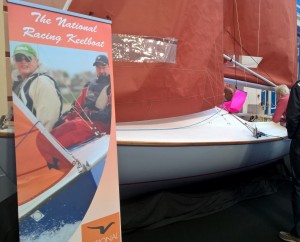
Glasgow University looked pleased to receive their fleet of 6 shiny new Fireflies just in time for the BUSA Team Race Playoffs.
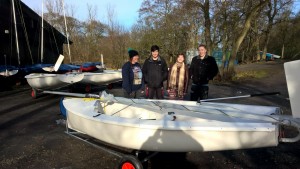
Paul & Innes were relieved to arrive safely after a 12 hour drive to get them there!
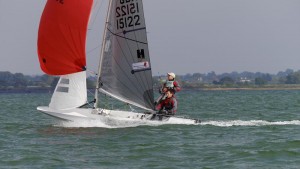
Dave Hall & Paul Constable during the Blackwater SC Dyer Cup 2015 – photo © Oliver Southgate
We spoke to Dave Hall about his sailing, his on-off relationship with the Fireball, his life in the marine industry including his role introducing the 29er to Europe, and his times at Hyde Sails.
Mark Jardine: Dave, how did you first get into sailing?
Dave Hall: My parents sailed back in the late 60’s with my sister and I when we were children. Mum and Dad were looking for something to do as a family and at that time sailing was growing at a rate, it just exploded in that period. We went down to the sailing club, went sailing and that was it – I was hooked. I was rubbish at football but found I was quite good at sailing.
Mark: Which club and classes were you sailing at that time?
Dave: We sailed at Shearwater Sailing Club, which is on a little lake in the Longleat Estate near Warminster. Living in Bath it was the nearest club back then. They bought a boat called a Carrycraft – I don’t suppose any exist anymore. Then I had a British Moth which was ideal for sailing on the lake, which I just club sailed. After a while my sister and I started sailing together in a Mirror and we began going to Open Meetings – that’s where we really got our first taste for racing and it just went from there really.
Mark: If I remember rightly, Shearwater is surrounded by tall trees. Did that provide with you good knowledge of how to use the shifts and the gusts?
Dave: I can remember to this day, the day I learned about wind shifts. I was tacking upwind following another boat, and I watched them tack every time the wind changed and he sailed away from me. It was like a bolt of lightning, “Oh yes, I see!”, so certainly it did that. Also, because most of the time there was no wind, I became very good at roll tacking.
Mark: So that was a bit of eureka moment as to how to use the shifts? And this was at Shearwater?
Dave: Yes, at Shearwater – that just changed the whole way that I sailed. That and reading a book by Eric Twiname which talked about wind bends. That is probably the other memory that I can distinctly remember.
Mark: You then got into the Mirror circuit. Was this competing in the Nationals or just open meetings in the local area?
Dave: It was just open meetings, which were huge. At that time there were very few classes so if you went to a local event like the Western Area Championship or similar you would be sailing against a hundred boats. Locally, and even down the West Country, there were loads of open meetings to go to. It was very competitive and we did start to do quite well – we were relying on our parents to take us to these events. It’s not like nowadays where the parents have RIBs and everything, my Mum and Dad were never going trail us further than 20 or 30 miles.
Mark: But if you had a local circuit on the doorstep and you could put the Mirror on the roof, you could still get to events that had large turnouts?
Dave: Absolutely, and that’s what we did and own little world became important. Just like people know their National Champions nowadays, we all knew our Western Area Champion and you would follow them – they would be your idol and you would be trying to beat them.
Mark: Do you think the dilution of the classes that has happened more recently is part of the reason the open meeting circuit isn’t as strong as it used to be back in your day?
Dave: Partly. I think there’s two reasons; one is the sheer cost and people’s time. I think the number of classes has probably done a lot of damage to clubs because if think you go to any sailing club now and you look out there are sixty boats on the water, it is hard trying to find two that are the same – we’re all handicap racing which is no good at all.
It would be great to get clubs and get fleets back together again. What we need is a big hole somewhere in some continent to bury a load of boats that we don’t want anymore. But I’m sure that wouldn’t go down too well with those class stalwarts that lovingly keep classes going!
Mark: When did you first get involved in the sailing industry?
Dave: That was 1978. I left school at 17, I started working in supermarkets, in the retail trade on a management training scheme to manage supermarkets. I did that for three years, but very quickly realized that if I wanted to carrying on sailing it wasn’t going to be a good career move. It was bad enough working Saturdays but I could see Sundays coming as well. So, one lunchtime when I was in the newsagent, flicking through the back of Yachts & Yachting, there was an advert there. I’d had a particularly bad day and there was an advert for London Dinghy Centre, which is now LDC / RS Sailing, who wanted a shop assistant in London. I thought, “I’m going to ring up!” So I just rung them straight away. They said, “Come up for an interview”, so I went up to London and they offered me the job. I found a bedsit next to the shop in Hither Green and that was it, I was in it, I was in the trade.
Mark: Did that allow you to carry on sailing, rather than the retail job in the supermarket that was restricting your sailing?
Dave: They were certainly more sympathetic. It was necessary to sail so that you had the knowledge and credibility to talk to the customers. You also needed to go sailing to meet people. Sailing and the sailing industry is still a face-to-face affair. People like to buy things from people they know and people who have the knowledge and skill. It’s still difficult in the retail trade because the shop had to be open Saturdays, so we did have to take turns on the weekends off.
Mark: So you couldn’t have every weekend for sailing, but it was better than the previous role?
Dave: That’s right. I didn’t want every weekend off to sail at the time because my home was in Bath and I was living in London. My girlfriend at the time, who is now my wife, was still living in Bath so I would go home on some weekends or my days off, I would go back or she would come up to see me. I didn’t want to go sailing every single weekend.
Mark: After LDC you had your first stint at Hyde Sails. How did you first get involved with Hyde Sails?
Dave: I had been at LDC for 10 years and at that time I was running the Datchet shop. It was out of season and I was thinking, “I can’t be doing the same thing again next season”. We had to get everything ready, and we had a windsurfing school as well, I really didn’t want to be doing this again!
I had a call from Richard Simmonds who was working for Laser at the time. He just rung up out of the blue and said, “I was having dinner with Edward Hyde and your name was mentioned. You might want to give him a call.” So I phoned Edward up, and he said, “Come and see me.” I went and had a chat with Edward, at the time I was sailing a Fireball and doing reasonably well and I was one of those people who people tell me is a nice person, just on the circuit being helpful and it seemed to go down well. So that was it, he offered me a job, and that’s really when my sailing took off. I did have more time because the weekends were free, also I was talking with people at the loft all the time about the sails and about the skill of sailing. A lot of knowledgeable people were there which meant my whole game basically rose.
Mark: Coming on to the different classes that you sailed, the Fireball is definitely a class that is close to your heart and you’ve come back to time and time again. What is it about the boat that you particularly like?
Dave: When I first started sailing them I’d stepped out of a Mirror or 420 and you get into a Fireball and think, “Wow, this thing takes off, what have I got here!” At the time it was the most exciting boat at a sensible cost, coupled with the fact that you could sail in big fleets with international competition and it’s great fun to sail. In a lot of the new boats, lots of your time isn’t spent concentrating on the racing as you’re just trying to get around the course. So it was just a great boat to sail.
We got better and better in the Fireball but we developed a reputation for coming second and it became a bit of a joke, that “Oh you’ve come Dave Hall today” or “You finished Dave Hall in this championship!” whenever you finished as runner-up.
In 1993 we came third in the Nationals, second at the Europeans, and the Worlds we should have won, but on the last day I completely messed it up – it was light winds and it just blew my mind. I remember coming in and thinking “I think we’ve done this… we need to do something else”.
Mark: And that’s when you decided to take a break from the class?
Dave: At that time a number of new exciting boats were coming out; the 5-tonner (Laser 5000), the RS boats, the ISO, a whole load of exciting things. It was amazing – a breath of fresh air and I started sailing the 5000 and it was just so much fun.
Hyde Sails make the Laser sails so we were involved in the promotion of the 5000 and it was a very exciting time. We had no idea what we were doing, but it was so much fun to have to do all this learning. Eventually we started to race it properly and got into the same trap again of racing and trying to get better at it.
We then managed to talk to Edward into buying an 18ft Skiff and again had a few fun years doing that.
Mark: This leads us on to Hyde sails. Throughout the years Hyde have made far more sails then probably people realize, white-labeling in other classes and other boats that might have Hyde Sails on but under a different label. Is this still a part of the business?
Dave: It’s a massive part of the business. Our own branded sails account for a lot and keep our profile high and we have a lot of customers that buy sails from us because they know we can deliver. We have a huge number of trade customers and sail maker customers – you would be very surprised to know the number of sails and sail makers that we make sails for, some names that would definitely surprise you.
Mark: I presume they come to you because they know they’re going to get a consistently good product?
Dave: They know what they are going to get. It’s not quite ‘press the button and it lands on the doorstep’ but it’s not far from that. With the facility we have out in the Philippines, which is completely owned and staffed by Hyde Sails employees, we can produce and deliver sails at an incredibly competitive price.
Mark: After your first stint at Hyde Sails you then moved onto Ovington Boats around the time that the 29er came out. Can you tell me about your role in getting the 29er established in the UK and Europe?
Dave: Yes, I ended up talking to Dave Ovington because I knew he had the 29er, I was trying to get the sail order for the 29er. I knew he had the 29er there and I knew he didn’t know what to do with it. I rang him up and said, “I’ll sell it for you.” He said, “Alright, let me think about it.” We had a chat and eventually he said, “Come on board and sell it.”
From 1998 to 2009 I trailed it around Europe to every sailing club, lake and sea venue that you can think of. We built the class up – it was a fantastic time, a lot of hard work and a lot of political opposition from the establishment not wanting it. But all the kids wanted it, the parents wanted to see their kids sailing it.
We picked up a lot of Topper sailors originally as they didn’t want to go the traditional other routes – they wanted something colourful and they really took to it. In Europe it was the Germans who really quickly got into it around Kiel and was quite a coup because the Kieler Yacht Club decided, against the DSV, that they were going support the 29er. They went out on their own and it just grew and grew with all these kids out in these 29ers.
We started off with a little National Championships with about 15 boats, then had the first World Championship at Lake Garda in 2000 with about 60 boats and that was it! Once we got into the Youth Worlds the class became so strong. I’m just so proud to have been a part of that, and to have started it. Thinking about the number of miles in the van and the work – it was all worth it as it’s just such a fantastic boat.
Mark: It could be said that the 29er revolutionized youth sailing in the UK, and brought up the sailors who are now capable of sailing the Moths, the 49ers. Do you feel that you played a major part in getting the boats ready and the infrastructure ready for people to sail those boats?
Dave: Yes certainly, and I’m sure it has kept a lot of people in sailing. When you actually look at the youth classes now, you still have the same number of 420s but the 29er has got 80 boats turning up and they’re all having an absolute ball. I remember Dylan Fletcher as a young 15 year old writing that 2012 was going to be his Olympics. He was an Olympic cycle out, but all those people have come through the 29er. There are so many people that are now sailing the high performance boats and also I have noticed the friendships that have been built because people were having so much fun. We’ve got 29er sailors who have married each other! People who I met back in the beginning of the 29er class are now husbands and wives.
Mark: You really did start a legacy there! After this you decided to get back to the Fireball after quite an extended break from the class?
Dave: Through nearly all my competitive sailing I have sailed with Paul Constable, in fact we must be the longest sailing partnership in history. We’d done the B14, 29er, 49er the 18ft Skiffs and some Melges 24 sailing, and in 2008 I stepped back in to a Fireball. I’d last sailed one in 1993 and I thought, “This is quite comfortable actually… I like this!” Funnily enough I bought the boat that beat us in 1989 when we were second in the Worlds. This boat was called Crocodile JD, an Australian boat – it came up for sale so I just bought it!
We went to the Inlands and came third, I found as you get a little bit older you find that you’re more careful going around marks and other things. Sailing a 49er or an 18, we weren’t racing it anymore, it was just getting around the course. Getting back in to a Fireball we were suddenly racing again. It was still fun; the boat is exciting, especially in the breeze, but you could sail it and you could race it. You could actually have your head out of the boat, and race other people, rather than just thinking, “Am I going to get around that gybe mark?” So we got back into it and for some reason I started building them too – I got a license and started building them myself.
Mark: After you had a spell with Rondar you went back to Hyde Sails. I presume with your Fireball sailing you were now making a lot of Hyde Sails for the fleet?
Dave: Yes, it was all hands to the pump. I’d started working at Hyde in February and we had the World Championship in the UK at Pwllheli in August. We dug out our designs from when I was there back in the ’90s, had a quick look at them, and thought things had actually moved on a lot since then. We literally had to start from scratch, and we got up to speed just in time for the Nationals and the Worlds. We hit the go button with some sails and after several sets later we did quite well in the Nationals. I didn’t do well at the Worlds and I think in hindsight that two weeks sailing in Pwllheli with force 6 winds was too much. What we should have done is enter the Pre-Worlds and do a couple of races and then do the Worlds because you can’t sustain two weeks of sailing at peak performance. The good thing was we made some sails for James Peters and Finn Sterritt and they finished second overall in the Worlds, winning the last 3 races by miles once they’d learnt how to sail Fireballs, so that was good.
Mark: So you clearly designed a fast set of sails pretty quickly. Hyde Sails is now fully active again in the one-design classes with yourself, Richard (Lovering) and Nigel (Grogan). Are you finding the Hyde name is really getting back known and utilized through these one-design classes?
Dave: Absolutely – you would be hard pressed to not see something about Hyde Sails in all the classes we’ve got a presence and sail which are the Flying 15, the Fireball, the 505, Squib, Dragon and XOD. Then we’ve got other people in the Merlin Rockets and Solos and many, many more. We’ve definitely got the profile there now and it’s a matter of turning that into people having the confidence to say, “Yes, Hyde Sails are back” and coming to talk to us and buy sails.
Mark: Your second stint with Hyde Sails has been under the new owner, Nigel Grogan, and he’s a very active sailor himself, as the reigning Squib National Champion and winning White Group at Cowes Week as well. Do you find it useful having an owner who is so active in the sailing scene himself?
Dave: Definitely. Nigel is a human dynamo and doesn’t stop. Jack, his son, is also sailing. The whole team is out there, Luke, Wooderz, Richard – the only way to sell sails is being absolutely involved in the sport – out there racing, talking to people and being part of the scenery.
Mark: This brings me back to my first question when you first got involved in the sailing industry: do you still get the time on the water, the time in the job, and time for your personal life. Do you manage to get that balance?
Dave: I’ve been very lucky, probably the luckiest man alive I think. I’ve been able to actually go sailing, work in an environment that I love, I’ve got a lovely wife and two great grown-up kids. I think I’ve been very fortunate as I’ve seen a lot of people come into the industry and have stopped sailing because it spoils it for them. But I’ve always managed to keep the sailing part fun and the selling part separate. When I get on the water I have to be a bit careful, but generally everybody is a competitor and are fair game. But on the shore you have to be nice. It does get a bit awkward in protests sometimes!
Mark: One other boat you sailed in 2016 was the K6, where you won the National Championship in Lymington? Could you tell me a bit about that?
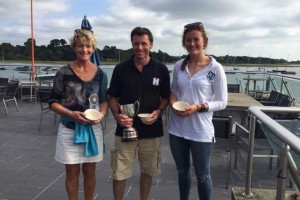
Dave: Again it’s a lovely boat – if you’ve never sailed one you should have a go – I got involved with sailing them when I was at Rondar. It’s a boat you can sail in almost any weather with anybody. I’ve sailed events with my wife, daughter and my son and I’ve sailed events with people that don’t sail. It’s a very easy boat to do that because all the controls are very simple. Also it is exciting because it goes pretty fast downwind with a big kite. We’ve been close to winning events at the Euro Cups and the Nationals but we managed to do it in 2016.
Mark: What are your plans for 2017?
Dave: We’re going to do the Fireball again, because it’s what I love doing, it’s a good crowd and it’s good competition. Hopefully we can do well at it and will put a lot of effort into it. I’m going to sail the 505 as well – and give that a go. I sailed one back in 1992 for a couple of seasons but never really got to grips with it. But I stepped back into one last year and, having sailed so many other boats, it wasn’t as daunting as I remember it being in ’92, so I’m looking forward to that challenge.
I would like to do some Merlin Rocket sailing as well if time permits. It’s an amazing fleet with such a spread of people; you’ve got young people and some right into their 70’s still sailing it. Everybody has a great time together, the racing is good and the standard of competition is so high. I had a go at the Nationals having never stepped in one and did embarrassingly badly. Half way through the week we managed to get half way up the fleet. We’ve got Ben McGrane using the sails in the fleet and we have some good sails now having worked very hard with Richard. I would like to do some Merlin sailing for two reasons; one because it’s a great crowd and a great boat to sail and obviously I’d like to sell some sails within the fleet as well – as we can do that at a cheaper price than most of the others.
Mark: Dave, many thanks for your time. It’s enlightening listening to your sailing stories and also hearing about your time in the industry.
Dave: Thank you very much. Good to talk to you!
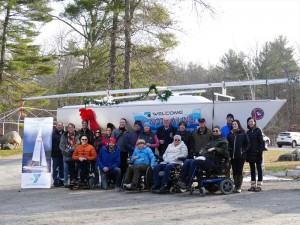
© Karen Miller
In June of 2015, the Clagett Boat Grant Program was established to increase the participation of sailors in disabled sailing. The Board of The Clagett, who endorsed the Boat Grant Program, recognized the need to assist adaptive sailors with increased access to boats and equipment. The first boat in this program, which is a Sonar, will be utilized by a program that has a similar mission to The Clagett which is to provide to adaptive sailors,”the opportunity to improve their skills and reach their personal goals through world-class coaching focused on Corinthian values.”
The first recipient of the Clagett Boat Grant Program is the Y-Knot Program, in Lake George, NY. The Y-Knot Program, which was founded in 1996 and is based at the YMCA Camp Chingachgook on Lake George states in its Mission Statement, ” Y-Knot Sailing strives to make all aspects of sailing accessible to individuals with disabilities by creating opportunities, providing education and promoting disabled sailing within the greater sailing community.”
“Even though there’s snow on the ground here at Y-Knot on Lake George, we’re excited to welcome the newest addition to our fleet: a brand new Sonar sailboat, thanks to the generosity of The Clagett Boat Grant Program. We’ll be taking advantage of the off-season to bring our sailors up to speed on this new boat with a series of chalk-talk sessions, and we’re looking forward to hitting the water running in the Spring. The Sonar gives us entry in to bigger-boat team based sailing, as well as the opportunity to integrate teams by putting both disabled and able bodied sailors on the boat together,” commented Spencer Raggio, Committee Chair of the Y-Knot Program.
The Oyster Bay Boat Shop, in Glen Cove NY, has donated a set of Sonar mast racks and a Sonar summer cockpit cover to the Clagett Boat Grant Program Sonar being used by Y-Knot.
Bam Miller, a member of The Clagett Working Committee, delivered the Sonar to Lake George and had this to say, “It was great to see a group of 20 people greeting us on our arrival with the Sonar in tow, including six of the Y-Knot sailors. The Y-Knot sailors are very much looking forward to utilizing the Sonar for both fleet and match racing and traveling to adaptive regattas especially the 15th Clagett in Newport, RI in June of 2017.”
“We at The Clagett are very happy that we have been able to assist the Y-Knot program in helping more adaptive sailors in to the Sonar boat, which we have granted to them and we look forward to seeing the Y-Knot sailors on the water at the Clagett events in 2017 and for many years to come, ” remarked Clagett President and co-founder, Judy McLennan.
2017 will be the 15th year of The Clagett with the clinic and regatta will be held June 22-25, in Newport, RI.
For more information about The Clagett visit www.clagettregatta.org
Dates & prices are now confirmed for two ‘must do’ events for 2017!

The Eurocup, hosted by Fraglia vela Riva, Lake Garda, from 26-30 June, sees a return to this extremely popular and exciting destination. Don’t miss it! The entry fee is £310 or €350/boat.
For more useful information including details of how you can get your boat delivered contact debbie@rondarboats.com or visit the K6 website www.k6class.org
The UK Nationals are at Weymouth & Portland National Sailing Academy from 8-10 September. We will be sailing from this fabulous venue and partying in Weymouth Town Centre, so maybe best to book your accommodation there. The entry fee is £139 or €156, and there will be lots of information on the above link. Both events will run in tandem with the K6 class.
For both these events, we need to have some commitment please before 31 January 2017.
If you are considering coming, please would you pay £50/boat per event to the following account –
K6 Class Association / 20-97-40 / 93942953
Please use the reference of the helm’s surname, plus Garda, Nationals or both.
If you would prefer to pay in Euro, please pay €50/boat per event to the following Euro account –
RS Classes International Group / 20-71-02 / 87225500
Please use the reference of the helm’s surname, plus Garda, Nationals or both.
Issued Sunday, November 20
Wednesday – Saturday, November 16-19, November 2016
As was the case on Thursday’s second day of the event when 25+ knot westerly winds with puffs well into the 30’s kept the racers ashore, the final day’s racing also had to be cancelled as the low hovering around Bermuda brought winds well in excess of 25 knots, gusting 35 knots.
When it was decided that the Viper 640 sports boats would travel to Bermuda during November 2016 for its major regatta, everyone was looking forward to the big winds that prevail on the Great Sound at that time of year. The wind came in but unfortunately it was just too much on two of the race days.

When PRO Hank Stuart raised Alpha over November flags, the desire to race was countered by the desire to not break boats…or people. Friday’s results for the 41 boats held fast, giving Zeke Horowitz (Annapolis, MD), Brendan Healey (Greenwich, CT), and Ian Coleman (Annapolis, MD) first place in both the International Regatta and North American Championship. Justin Scott (Darien, CT) sailing with Rob Crane (Darien, CT) and Trevor Burd (Marblehead, MA) claimed second place, also winning the Governors’ Cup (top finishing skipper over 55 years of age). Geoff Fargo, Jeff Grange, and Spencer Steffen, all hailing from Santa Barbara, CA, were third and also the top placing Corinthian crew.
A handful of crews did go for a sail Saturday morning inside the more protected waters of Hamilton Harbor and they were rewarded with spectacular downwind sleigh rides, noting that had they been outside in the Great Sound it would been difficult for even the most skilled among the fleet to handle the strong, frequent squalls.
With sailors coming to Bermuda from across the U.S., Canada, Australia, and the UK, the competition was very tight. A look at the scores revealed that, with the exception of Horowitz’s winning 10 points, had the regatta sailed the final day, the scoreboard would surely have been very different. Close competition, excellent courses, big breezes, and good sportsmanship prevailed throughout the racing; and ashore, event co-chairs Somers Kempe and Doug De Couto beautifully executed a logistically challenging regatta. Sailors were able to enjoy the hospitality and grandeur of both host clubs, the Royal Bermuda Yacht Club and the Royal Hamilton Amateur Dinghy Club.
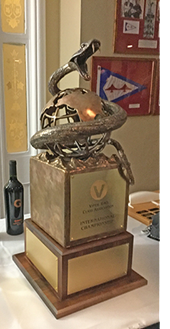 While the Viper 640 Class has held its North American Championship for many years, this is the first time the Class hosted an International Championship. In doing so, it was necessary to have a new perpetual trophy and a sculptor was commissioned to create a piece of art reflecting the Viper’s growing global presence. What he came back with is a unique bronze sculpture that will definitely stand out in any yacht club’s trophy case.
While the Viper 640 Class has held its North American Championship for many years, this is the first time the Class hosted an International Championship. In doing so, it was necessary to have a new perpetual trophy and a sculptor was commissioned to create a piece of art reflecting the Viper’s growing global presence. What he came back with is a unique bronze sculpture that will definitely stand out in any yacht club’s trophy case.
When asked about his winning the International and North American Championships, Horowitz was proud of his accomplishment giving the credit to his crewmates Coleman and Healy. “When I joined the Viper Class I knew I’d be more competitive if I had a regular crew,” said Horowitz, “and I was able to talk two of my best friends into joining me on the boat. It helps that Ian and Brendan are both spectacular sailors. It was really great for the three of us to be racing 40 other Vipers on the beautiful island of Bermuda.”
The regatta concluded Saturday night at the RHADC with a cocktail party and prize giving bringing everyone together one last time.
MORE FOR EDITORS:
As has been noted in the past, in addition to the great boats these men and women sail, they find the camaraderie among Viper sailors and the international friendships that have developed over years keep them coming back. There were sailors in their early 20s and in their 70s racing competitively, there were parent/child crew combinations as well as husband and wife teams. Of note was the seventh place team comprised of two married couples: Peter and Rachel Beardsley sailing with Jay and Rachel Rhame. Rachel Rhame sailed as hard as anyone on the course despite being five months pregnant. The joke was if they were sailing 4-up or 5?
The sailors were treated to not only the benefit of having an International Race Officer (Stuart) running the races, but they also were served by an International Jury headed by Bermudian IJ Robert Duffy. And, as is the case with most regattas of this magnitude, it would not have been possible to be held without the cooperation and support of the many sponsors including: presenting sponsor Aspen RE, long-term Viper 640 Class sponsor EFG, host sponsor the Bermuda Tourism Authority, shipping sponsors Bermuda Container Line, Bermuda International Shipping Ltd, Somers Isles Shipping Ltd, and Bermuda Forwarders and supporting sponsors Goslings, Gubinelli Wine, Oleander Cycles, Newstead Belmont Hills, and Island Construction.
For more information contact Viper 640 Class Association Administrator Ed “Buttons” Padin (epadin@padesta.com) or Rondar Raceboats’ Dan Tucker (dan@rondarboats.com). For more information about the Aspen Viper 640 International Championship presented by EFG contact event chair Doug De Couto (decouto@alum.mit.edu) or Royal Bermuda Yacht Club Commodore Somers Kempe (somers@mahoganyreef.com).
Day 3 at the Aspen Viper 640 International Championship Regatta, Hamilton, Bermuda.
He may have only won one of today’s four races, but his consistent top-5 finishes allowed Zeke Horowitz (Annapolis, MD), sailing with Brendan Healey (Greenwich, CT) and Ian Coleman (Annapolis, MD), to maintain a commanding lead after races three to six were completed today on Bermuda’s Great Sound.
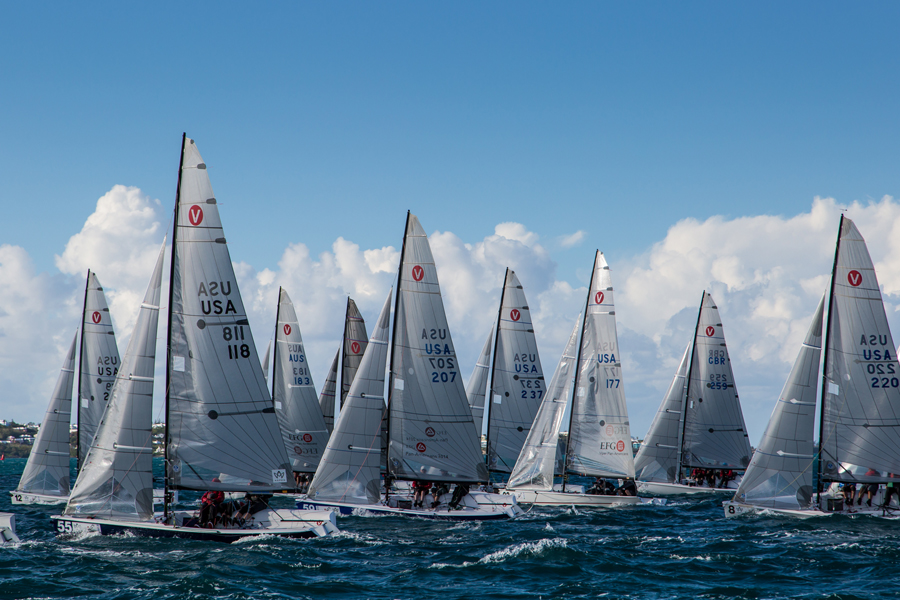
The forty plus fleet get off to another start in Bermuda.
Their yellow spinnaker, now a familiar fixture at the front off the fleet, let the rest of the sailors know that this trio was out to win both the Aspen Viper 640 International Championship sponsored by EFG as well as the Viper 640 North Americans being sailed for at the same time. “Sure, it’s great to be at the top of the results,” said Horowitz, “but it’s equally as great to be here sailing on these beautiful Bermudian waters among the 40 other Viper 640s that are racing.”
Over forty Viper 640s have been racing including local boats, boats from the U.S., Canada, Great Britain, and Australia. While not technically a World Championship, the racing is as high-level as one could expect at such an international event.
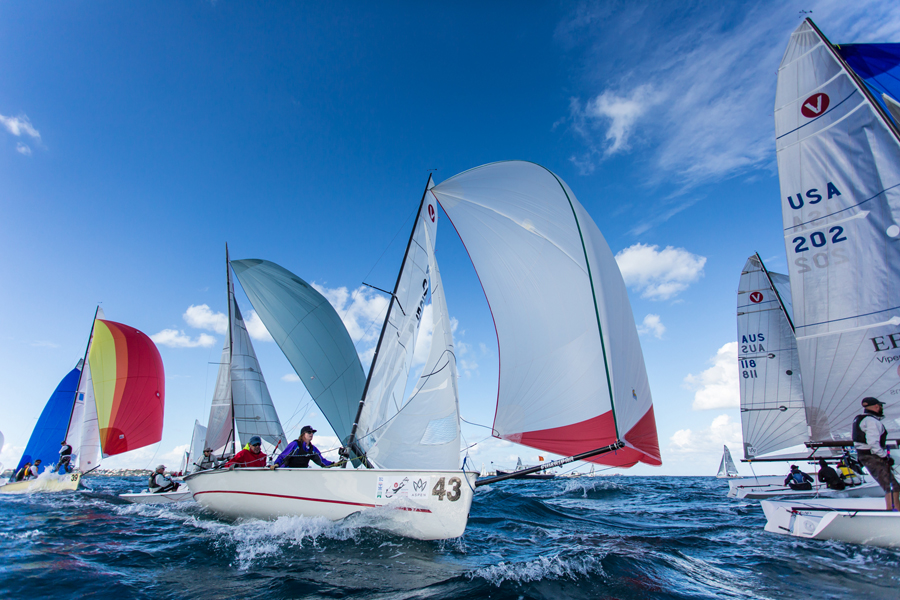
The fleet round the top mark.
Standing in second place with 24 points is Justin Scott (Darien, CT) sailing with Rob Crane (Darien, CT) and Trevor Burd (Marblehead. MA) recording second and first place finishes in the first two of today’s four races. Geoff Fargo, Jeff Grange, and Spencer Steffen, all hailing from Santa Barbara, CA, stand in third place at 32 points having finished second in the final race of the day.
Throughout the fleet, the competitive nature of the sailors was evident as boats’ scorelines often report top ten and “deeper” finishes.
Today’s racing was delayed for an hour as the wind refused to settle into a consistent direction. At about noon, International Race Officer and PRO Hank Stuart got off the first race of the day and the third race of the series. Compared to the past two days, today’s sailing was dry with the exception of one major 20+ knot rain squall that stormed through race three. Temperatures in the 70 degree ( 21C) range gave everyone their fill of spectacular racing.
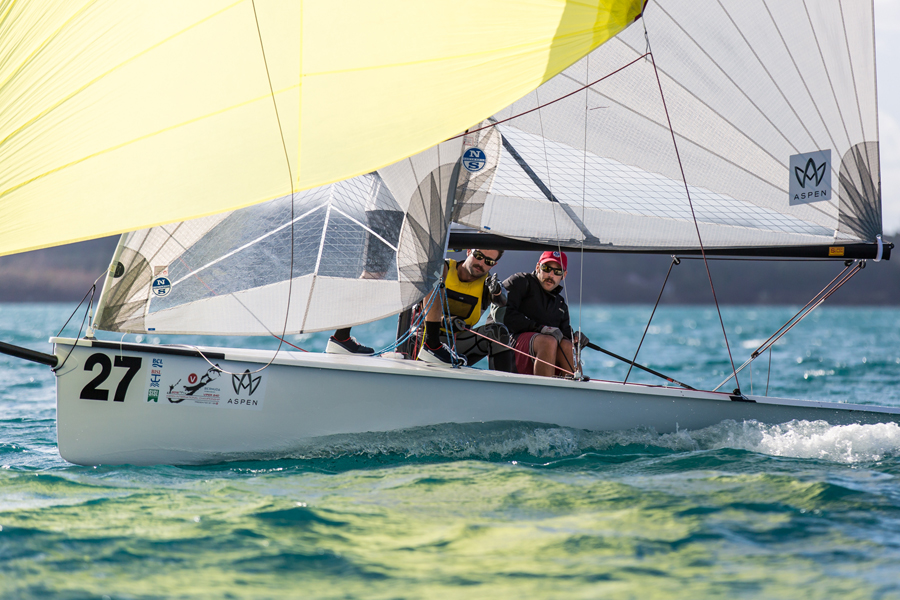
Zeke Horowitz and team lead the International Regatta in Bermuda.
The final day of racing is set for tomorrow and more excellent conditions are forecasted. Follow all racing in real time and see regatta photos at :
https://www.facebook.com/2016Viper640InternationalChampionship/?fref=ts with daily recaps at www.viper640.corg.
End
Issued Saturday 19th November 2016
Contact: Edward Padin, Viper 640 Class Administrator, epadin@padesta.com

| Customer Services | +44 (0) 7811957649 |
All Rights Reserved Rondar Raceboats - 1955 -
Site Designed by Strawberry Marketing UK Ltd